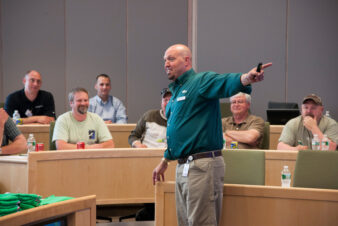New York — The American National Standards Institute (ANSI) Energy Efficiency Standardization
Coordination Collaborative (EESCC) on Wednesday announced the publication of a Progress Report detailing the
standardization community’s activity to advance recommendations outlined in the EESCC’s Standardization Roadmap:
Energy Efficiency in the Built Environment. Published in June 2014 to serve as a national framework for action and
coordination, the roadmap identified gaps where standards and codes were needed to improve energy and water
efficiency in the built environment. Pete DeMarco, IAPMO’s Executive Vice President of Advocacy and Research, acted
as the lead facilitator for the update.
The Progress Report features updates on 71 of the 109 standards-based gaps identified in the roadmap, demonstrating
significant progress within the standardization community to advance energy and water efficiency through standardsbased
solutions. The report also includes a summary of all of the standards-based roadmap gaps, including those for
which there is no known progress at this time, so that readers may easily identify opportunities to take action on
closing the gaps.
Read the Progress Report here: http://www.iapmo.org/Documents/EESCC-Progress-Report-2016.pdf
Formed in 2012, the EESCC is a cross-sector, neutral forum and focal point for broad-based coordination among energy
efficiency activities involving or impacted by standardization. The goal of the collaborative is to guide, facilitate, and
coordinate standardization activities to support greater energy and water efficiency in the United States. More than 160
public- and private-sector experts from industry, federal agencies, standards and code developing organizations, energy
and water efficiency-focused organizations, and educational institutions have contributed to the EESCC’s efforts.
“The EESCC’s Progress Report provides an opportunity to see how standards developing organizations (SDOs) are
collectively addressing identified knowledge gaps and progressing the building sciences as new information, research,
best practices, and emerging technologies become available,” DeMarco said.
For more information about the work of the EESCC, visit www.ansi.org/eescc.




Join the conversation: